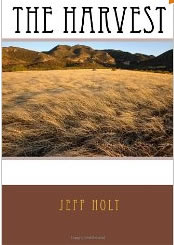Book Review
Jeff Holt, The Harvest, White Violet Press, 2012
by Marybeth Rua-Larsen
These are not happy poems. There is no sunshine and there are no rainbows. There is, however, much to admire in Jeff Holt’s chapbook collection, Harvest, most notably his empathy and compassion for fellow human beings. As a Licensed Professional Counselor, Holt focuses on the demons many of us face—abuse, loneliness, divorce, failed friendships, lost lovers and mental illness. The people who populate Holt’s poems are obsessive and some of them hear voices. They struggle, and though they often fail, they encourage us to be less judgmental and more understanding.
Holt blends a contemporary use of topic and voice with the more traditional elements of form. Of the thirty poems included, over half of them are sonnets plus an additional short sonnet sequence. There are also five villanelles, which are especially well-suited to the obsessive tendencies of his speakers, a sestina and several in rhyming quatrains. Holt also chooses to capitalize the first word of each line in every poem. While I’m not generally a fan of this tradition, in this case the choice highlights Holt’s elegant and precise lines, such as in “The Stranger”:
His uncle took him on a fishing trip,
Leaving his brothers, who had asked to come,
Bored at the house. Watching the wormed hooks dip
Into the lake, he felt his older chum
Touch his bare back, and rub him lightly there.
When he looked up, his uncle smiled and said
We’ll catch a bass, you’ll see. He grinned, aware
That he was special.
Later, Uncle shed
His sweaty clothes, saying true fishermen
Sleep nude. Wanting to please his hero, he
Stripped, shivering. Touching his back again,
His uncle spoke, his voice grown strange with glee,
Then pressed him close. Frozen, he felt a hand
Slide down his skin, a stranger’s slick demand.
The initial caps are especially effective here at heightening the trauma. We witness what should never be witnessed, and the slight pauses at the beginning of each line are necessary to help us catch our breath and brace ourselves for the abuse to come. Holt doesn’t shy away from the horrific, and some of the personas, both children and adults, are institutionalized. Their expressions of fear and isolation earn our compassion.
Yes—there are lighter moments, too. A small series of poems on poets and the writing of poetry are scattered throughout the collection. Holt has a sardonic and self-deprecating wit, evident in this excerpt from “Don’t Marry Poets”:
Don’t marry poets. We’re a dreadful lot.
We will amaze you on our first few dates
With our command of words. That’s all we’ve got,
Fine webs of language for potential mates.We poets learn to study what we say.
When writing, we must constantly revise.
Our words are lovers we will throw away
When sweeter, more seductive ones arise.
These poems prompt us to treat ourselves and others more gently and be more forgiving; they help us develop compassion for all that we can’t see. Holt gives voice to the voiceless and makes us all more human in the process.
Marybeth Rua-Larsen lives in Massachusetts and teaches part-time at Bristol Community College. Her poems, essays and reviews have been published in The Raintown Review, Crannog, and The Poetry Bus, among others. She won in the Poetry category for the 2011 Over the Edge New Writer of the Year Competition in Galway, and her chapbook Nothing In Between will be published by Barefoot Muse Press in 2014.


